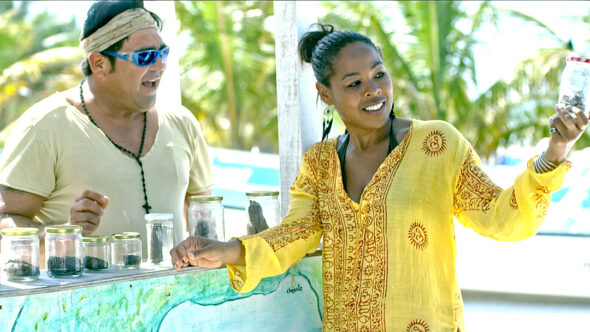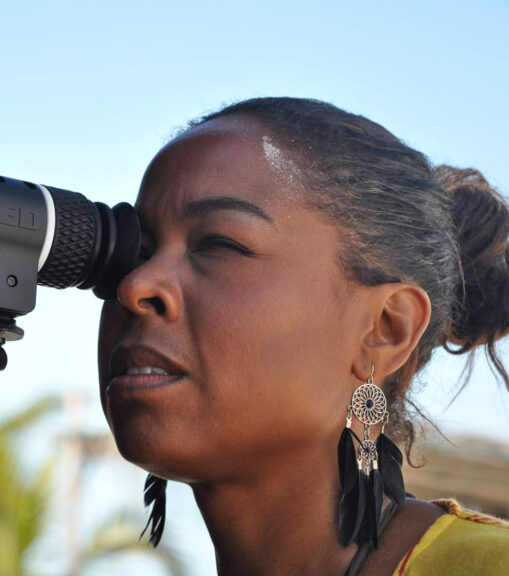
Yellow Springs native Jennifer Sharp wrote, directed and edited the film “Una Great Movie,” which recently debuted digitally on Amazon. Sharp also acted in the film, portraying the character Jenny. Here, she is pictured inspecting the wares of the island’s “vendor philosopher,” who shares wisdom along with his wares. (Film still)
Villager debuts ‘Una Great Movie’
- Published: July 30, 2022
“True art should have no rules.”
This mantra, spoken by a character in village native Jennifer Sharp’s film “Una Great Movie,” isn’t just a one-off statement; it’s the grounding theme of the film itself, and of Sharp’s outlook when writing, directing, acting in and editing the film over the course of the last several years.
In fact, Sharp told the News in an interview last week, “Una Great Movie,” which was released digitally via Amazon this month, has really been in the works for closer to two decades.
It all began after Sharp studied acting at NYU’s Tisch School of the Arts. Sharp said it was difficult finding compelling, challenging acting roles. Hungry to try something new, Sharp wrote and directed a short film to stretch her dramatic muscles.
“And I was like, ‘Oh, this is where I belong — behind the camera, not in front of it,’” Sharp said.
After graduating from Tisch, and realizing that filmmaking was where her creative heart rested, Sharp visited a remote island in Mexico in 1999. From almost the moment she stepped on shore, she said, she knew the island was her muse.
“Six months later, I went back and lived there, and I wrote my first script there,” she said.
Sharp said she made a host of friends on the island, and told them all: “I’m going to make a movie here someday.”
It ended up taking a little longer than she expected.
In the intervening years, Sharp worked — and continues to work — in the film industry as a production designer, art director and editor, mostly on independent films, but also on corporate projects. She also teaches directing, producing and production design at the New York Film Academy.
All the while, she was writing feature-length scripts — including revisions of the original script she’d penned in Mexico. She sent her work to agents for consideration, but received rejection after rejection.
By 2016 — more than 16 years after her original declaration on the island — Sharp still hadn’t returned to make her movie.
“I had hoped that someone would buy it or produce it, and I realized that wasn’t happening — I had to do it myself,” Sharp said.
This realization was daunting. She’d have to rework her script to be manageable on an independent film budget. She’d also have to find that budget herself. Sharp said that, in addition to fundraising, she financed the film with credit cards.
But she also knew that funding the movie herself meant she had total creative control. Within that budget, she could make the kinds of decisions denied to her by all the rejections she’d received over the years. She could cast Black and Mexican actors as the film’s leads and supporting cast.
And she could include her friends from the island in the production of the film she’d promised to make all those years ago.
Which is what she did.
“Una Great Movie” — “una” being the Spanish word for “a” — is really a movie within a movie. Audiences begin by following the journey of Susan (Numa Perrier), a woman who visits an island in Mexico to rekindle a connection with a lost love 10 years after the flame burned out. Susan wanders the island, meeting locals and trying to find the man she once knew.
Within a few scenes, however, that narrative is interrupted by an off-screen voice: “I’m losing interest,” the voice says. “Who is she?”
The film cuts to an office, where a suit-wearing executive tells another woman — screenwriter Zoe (JoNell Kennedy), the story’s other main character — that this is “not a great movie.”

Jennifer Sharp recently debuted her new film, “Una Great Movie.” (Submitted photo)
“We need to be able to relate to her — give her a job,” the executive insists. “Make her a barista!”
And suddenly, we’re back with Susan on the island, where she tells a local: “I’m a barista. It’s my job.”
This device runs the length of the film: As Zoe receives more and more advice from script doctors, film industry execs and her own friends, Susan’s story changes. Actors are replaced, characters are added and some characters’ motivations shift.
The gambit works in tandem with one of the film’s underlying themes: The difficulty of remaining true to one’s artistic sense in a system in which any work will be subject to the whims of agents, producers and studios. Sharp said, however, that it was also a practical choice.
“I needed a Plan B, because I was using all my friends and you can’t always count on them,” she said. “So if someone doesn’t show up and I need a different actor, I could have an agent saying, ‘I don’t like the idea of that kind of an actor’ or whatever, and then it changes.”
Sharp added that she ended up not really needing Plan B, as all of the friends she enlisted for aid were enthusiastic to participate in the project. With the exception of one scene, in which an actor backed out and had to be recast, everyone showed up. By that point, the film’s thematic backbone — and Sharp’s own experiences — were driving the story anyway.
“I didn’t even know this movie was about me until I saw the first cut,” Sharp said. “But it’s 100% my story.”
Much of the advice Zoe receives on her script in the film, Sharp said, was taken nearly word-for-word from agent or studio rejections she received in response to her own writing over the years.
“I keep all my rejections,” she said. “All the rules that people bombard you with — ‘It won’t sell because of this, it can’t do this, you can’t do that’ — all that stuff has been said to me, and so this is my way of saying, ‘Stop with the rules. If it works, it works.’”
Sharp herself appears in the movie as the appropriately named Jenny, who is both a friend to Zoe and ultimately written into Zoe’s script as a friend to Susan. Sharp said she cast herself “by default.”
“I actually didn’t want to act in it, but when you’re doing it all yourself, you kind of have to,” she said.
Jenny’s character arc takes place alongside, and sometimes in contrast, to Susan’s. She ends up falling in love with the island and the people who live there, spending scenes talking in bars and on beaches with locals, waxing philosophical about the meaning of life. She also becomes somewhat radicalized by the plight of the island’s locals against encroaching corporate interest and tourism.
Of course, Jenny is also a tourist, as Sharp pointed out. So was Sharp herself, lured to the island — which she said she has been loath to name in press events for “Una Great Movie” — by stories she heard growing up in Yellow Springs.
Sharp said she was great friends with the local Bieri family in her youth, and would often spend time at the dinner table hearing naturalist George Bieri talk about his own time on the unnamed island as a teenager. He described a fishing community untouched by cars and development, where locals swam with stingrays and still caught fish with spears. He would not, however, tell his family or Sharp the name of the island.
“He didn’t want it to become touristy,” Sharp said. “He was like, ‘This place is paradise and I won’t be responsible for anybody going.’”
Eventually, though, Sharp said Bieri took his family to visit the island while on a trip to Mexico, and the secret was out — at least, among the family and, later, Sharp herself.
The island became a tourist draw anyway, Sharp said. When she first visited in 1999, she said tourists were still somewhat scarce. She was offered a plot of land on the island for around $10,000 — which she didn’t buy, not only because she couldn’t afford it at the time, but because she felt, as someone not from the island, she “didn’t deserve” to. Now, she said, that same land has a price tag in the millions.
But Sharp added that, though there’s some sorrow in that kind of change coming to the island, she also felt it was, in some ways, inevitable.
“I look at L.A. and other cities, and these all used to be beautiful, natural places,” she said. “This is humanity — this is what we do.”
And for the locals on the island, she said, accepting and adjusting to tourism and corporate influence is often about survival — another theme that winds its way through “Una Great Movie.” Survival is what drives the film to its eventual, perhaps unconventional, ending, though that ending won’t be spoiled here.
“Una Great Movie” itself survived, Sharp said, because she continued to believe in it, even if the film industry didn’t. Meditating on the ending of the film — and the many rejections she received over the years — Sharp said she hopes her work will finally find an audience that believes in it, too.
“Let’s just say, there’s open endings all around,” she said. “And that’s life, isn’t it?”
“Una Great Movie” is now available to rent or purchase digitally via Amazon.
The Yellow Springs News encourages respectful discussion of this article.
You must login to post a comment.
Don't have a login? Register for a free YSNews.com account.











No comments yet for this article.